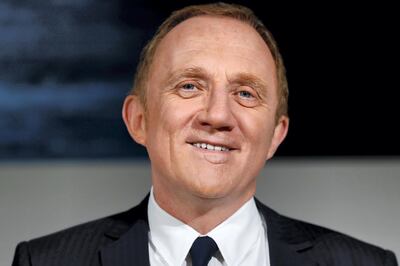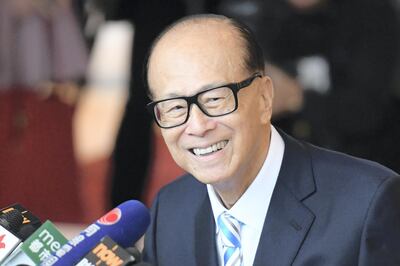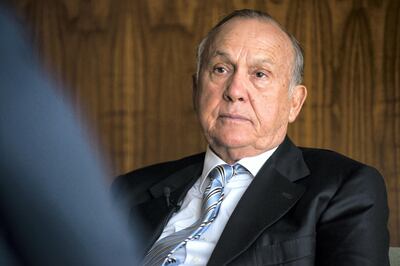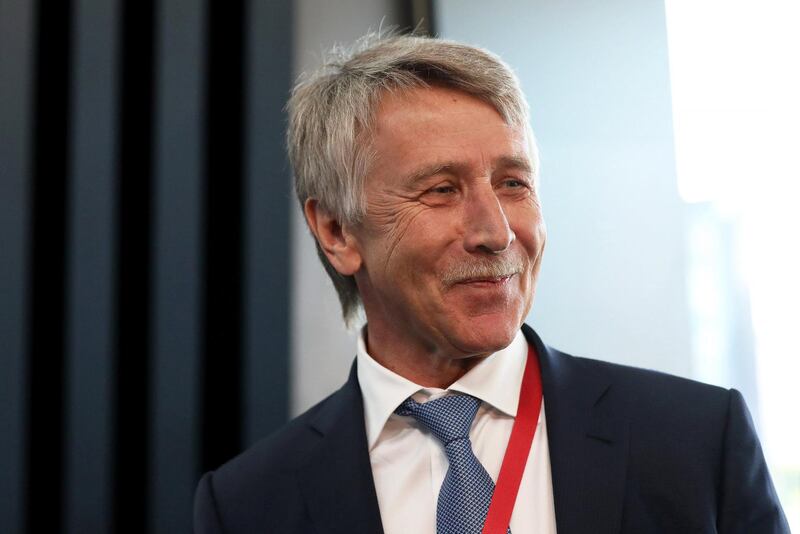Leonid Mikhelson
Energy tycoon Leonid Mikhelson has emerged as one of Russia’s biggest buyers of contemporary art, something that would have seemed unfathomable less than a decade ago.
His collection, worth an estimated $200 million, includes works by Gerhard Richter, Christopher Wool and Rudolf Stingel. Mr Mikhelson, 62, is also building a $130m centre of contemporary art in Moscow, in a market with a capacity roughly equal to one evening auction in New York, according to Vladimir Ovcharenko, founder of the Vladey auction house.
Russia’s richest collectors prefer to buy classic paintings of old masters, which “they were charmed by in childhood, taught about in school or saw in the Hermitage Museum,” said Irina Stepanova, head of Sotheby’s Russia, which made its first foray in the region in 1988 with an exhibition of contemporary art in Moscow.
“A lot of wealthy people don’t understand and buy contemporary art because they were brought up in dogmatic Soviet society,” said Mr Ovcharenko, who also owns Moscow’s Regina Gallery.
In 2009, art expert Teresa Mavica was asked to tour the Venice Biennale on Mikhelson’s behalf.
“We spent the whole day walking around pavilions discussing art,” Ms Mavica, now the director of his art foundation, said in an interview. “And in the evening of that very day Leonid asked me if I wanted to work for him.”
Mr Mikhelson, like many wealthy Russians, collected mainly classic art at that time. But just nine years later, his views have changed radically.
“When we met, Leonid said that he collects Russian impressionism,” Ms Mavica said, recalling one of her first meetings with Mr Mikhelson. “I said that it doesn’t correspond with his rank.”
Mr Mikhelson, a former Soviet engineer, sold his car to buy a stake in a pipeline construction company after it was privatised in the wake of the USSR’s collapse. He went on to build Novatek, now Russia’s largest non-state-owned natural gas provider, which produces about 9 per cent of the nation’s supply. He’s now worth $18.7 billion, making him Russia’s third-richest person, according to the Bloomberg Billionaires Index.
In 2009, Mikhelson established the V-A-C foundation (Victoria the Art of being Contemporary) in honour of his daughter Victoria, to promote Russian contemporary art abroad and support it through grants and new commissions.
Five years later, he paid almost $30 million for a rundown Moscow power plant built more than a century earlier. About 70,000 tons of ancient equipment has been removed since, and a gleaming 125,000-square-foot centre is set to open next year. He hired famed architect Renzo Piano, who designed the Shard in London and Centre Pompidou in Paris, for the project.
The opening will be an epic event for contemporary art in the country, where annual sales range from just $10 to $25 million, according to data compiled by Bloomberg.
“The Russian market of contemporary art is minor, outsider and sporadic,” said Dmitry Khankin, head of Moscow’s Triumph Gallery, one of the nation’s oldest.

Francois Pinault
Perhaps only in France would a billionaire and one of the nation's most powerful bankers both publicly chastise the president for neglecting ordinary people.
But such is France's professed attachment to its egalitarian tradition that such unlikely critics took aim at Emmanuel Macron in June over his promotion of a more meritocratic culture.
"Macron doesn't understand the little people. I'm afraid he's leading France towards a system that leaves the least favoured behind," Le Monde quoted Francois Pinault, whose business empire includes the Gucci fashion house, as saying.
The man who led Mr Macron's presidential campaign last year, Richard Ferrand, reacted with irony. "No doubt only billionaires can understand others," he tweeted in response to Pinault, one of France's richest men.
Mr Macron, who defeated a far right populist in the 2017 election, questions his predecessors' preference for hefty welfare transfers from the rich to the poor to ease inequality.
Instead, he believes in removing barriers to success for the most talented in France, who will then pull society up generally by starting companies and creating jobs.
The 40-year-old former investment banker has justified the scrapping of the wealth tax, for example, with the metaphor of a lead mountaineer drawing up companions clinging to a rope below.
But Mr Pinault, the founder of the Kering luxury goods group, is not alone in worrying about poorer citizens, many of whom live on suburban housing estates that ring French cities.
Matthieu Pigasse, who heads the Lazard investment bank in France, said: "He lacks an essential social dimension and a policy to fight against inequalities in all forms."
"Where are the plans for the suburbs, the fight against poverty and extra efforts for higher education?" the dealmaker who part owns Le Monde and other media, told Les Echos business newspaper.
While France has inequality problems, they are not as severe as in other rich countries, OECD data show. This is largely due to the large social transfers, which Mr Macron criticised this month for costing "too much dough" and which help explain why French taxes are among the highest in the world.
Mr Macron's comment went down poorly with the French left, and others, adding to perceptions that he is out of touch with ordinary folk.
Then this week reports emerged that taxpayers' money will fund dinner plates at the Elysee Palace and a new swimming pool at a presidential retreat on the Riviera.
Voters are unconvinced his meritocratic push is reducing inequalities. More than half believe they have worsened under his leadership, according to an OpinionWay poll last month.
However, Mr Pigasse said: "I wish him success, because he's the last bastion against populism in France."

Li Ka-shing
China’s richest people are buying into Xiaomi's imminent Hong Kong initial public offering, conferring their imprimatur on the world’s biggest coming-out party in two years.
Former CK Hutchison Holdings chairman Li Ka-shing, known as “superman” for his business acumen, plans to invest $30m for an unknown slice of the Chinese smartphone maker, according to people familiar with the matter.
Alibaba founder Jack Ma and Tencent Chairman Pony Ma - the country’s two richest persons - have also agreed to take stakes in Xiaomi, said the people, who asked not to be identified discussing personal investments.
The billionaire triumvirate join a group of big corporate names backing an IPO that could raise as much as $6.1bn - the world’s biggest first-time share sale since Postal Savings Bank of China raised $7.6bn in Hong Kong in 2016. China Mobile, the nation’s biggest wireless carrier, and US chipmaker Qualcomm are among those that have agreed to participate as cornerstone investors, according to terms for the deal obtained by Bloomberg.
Mr Li’s participation could go down well with individual investors in Hong Kong, where the now-retired businessman enjoys near-celebrity status. He is investing through the Li Ka Shing Foundation, one of the people said. Mr Li’s deal was first reported by the Hong Kong Economic Journal.
For the Mas, it’s unclear which entity they would use to buy their stakes. Alibaba Group Holding and CK Hutchison representatives had no immediate comment. Tencent Holdings representative Jane Yip did not respond to requests for comment.

Christo Wiese
South African billionaire Christo Wiese received more bad news as a company in which he is the biggest shareholder reported a decline in the value of its investments alongside higher borrowings.
Brait, in which Wiese owns a 35 per cent stake, said net asset value was 57.32 rand ($4.22)) at the end of March, compared with a restated 77.63 rand a year earlier, with retailer New Look struggling amid a sales slump on the U.K.’s shopping streets. The company’s other assets include fitness chain Virgin Active and supermarket chain Iceland.
Mr Wiese’s net worth plunged when Steinhoff International Holdings, in which he was the largest investor, reported accounting irregularities late last year. While Brait is unrelated to the scandal-hit clothing and furniture retailer, its stock has slumped 41 per cent over the past 12 months, reducing the value of Wiese’s Brait stake to about 7bn rand ($479m). The 76-year-old is now worth about $2.3bn, according to the Bloomberg BillionairesIndex, compared with $5bn before the Steinhoff scandal erupted.
Brait shares lost as much as 6 per cent before reversing to gain 3.4 per cent by the close in Johannesburg. The company decided not to declare a dividend and rather focus on reducing its debt, it said in a statement Tuesday. Borrowings climbed 77 per cent to 4.7bn rand.
Mr Wiese quit as a non-executive director of New Look last month and as non-executive chairman of Brait South Africa, citing time constraints as he gears up for a legal battle with Steinhoff. He is suing the owner of Conforama in France and Mattress Firm in the US for 59bn rand.
Mr Wiese has this year sold shares in Shoprite Holdings, Brait and Aspen Pharmacare Holdings to raise cash. The billionaire’s stake in Steinhoff was cut to about 6 per cent earlier this year, from 20.5 per cent, after banks sold stock put up by the former chairman to secure margin loans.
According to the statement, he has also sold a special-purpose vehicle which carried 1.4bn euros ($1.6bn) of debt to Brait for a notional sum. That debt is now guaranteed by Brait rather than Titan Premier Investments, another Mr Wiese company.
Mr Wiese is also the largest shareholder in South African investment company Invicta Holdings, which recently revealed that annual profit fell 23 per cent and that it is in discussions with South Africa’s tax agency over payments. The shares of that company have slumped 27 per cent this year.






